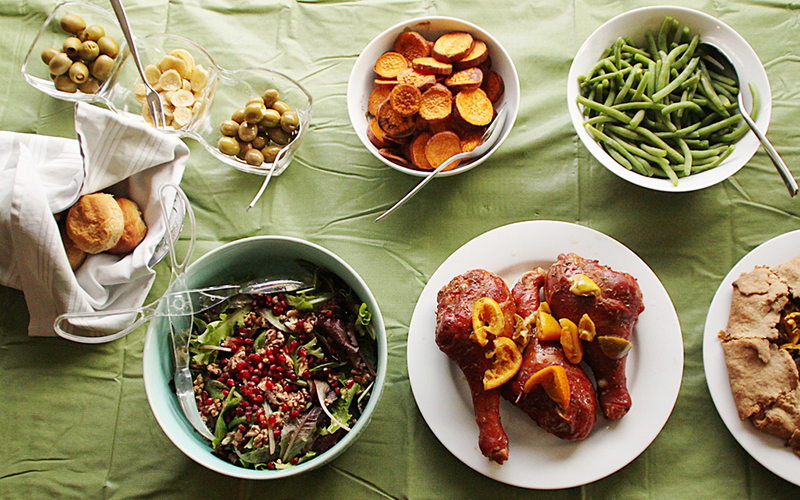
What can you do this year to keep your turkey dinner from clucking up the world? Photo: Stacy Spensley / CC BY SA 2.0
This blog was updated on 11/24/20
Normally on Thanksgiving Day, we host my husband’s family for a big feast. That means 14 hungry adults and kids clamoring for food. But Thanksgiving 2020 will be anything but normal.
This year, many families are having small-scale get-togethers or opting for virtual celebrations – in true 2020 fashion. Even though we have a lot fewer people to cook for this year, my husband and I are still planning to make a Thanksgiving feast – meaning we need to be even more careful not to overbuy and waste food.
Because food scraps often end up buried in a landfill, they are terribly damaging to the environment.
So, let’s think about this for a second. What can you do this year to keep your turkey dinner from clucking up the world?
The Visible and Invisible Costs of Food Waste
In the United States, we waste a staggering 40% of our food. Some goes unpicked at farms because there is no market for it. Some is wasted because of poor and confusing labeling laws (“best by” is not the same as “expiration”). Still, more food is thrown out from cafeteria trays and restaurant tables. And about 45% gets tossed out in our homes each year (most of us throw away about 24 pounds of food each month). In Massachusetts alone, we send about a million tons of food and yard waste to our landfills and incinerators each year.
This is a big problem because:
- Nearly 20% of people in this country don’t have enough food to eat;
- $218 billion worth of food is thrown away each year in the United States;
- Food and yard waste in landfills creates methane, a climate-damaging gas that is 84 times more potent than carbon dioxide.
While what happens to food waste is tied up in a much larger system of how cities, towns, and the state handle our household waste, individual actions still matter! So, I’m here to give you a few tried and true tips for minimizing your food waste this Thanksgiving. It’ll save you money, time, and angst – and you’ll be doing your part for the environment.
Shop Well, Little Grasshopper
- Buy the Right Amount – With fewer people coming over for Thanksgiving dinner this year, rethink your grocery list. You can buy a smaller turkey, just roast the parts of the turkey you like (is anyone going to eat the turkey leg if your Uncle Ted isn’t coming over?) or even swap out the traditional turkey for a rotisserie chicken! Also, think about how many days you’re actually going to eat leftovers. These are things you should figure out before going to the grocery store, so you don’t overbuy and waste money. After the dust settles and everything is eaten, write down what you would do for the same-sized group so that you’re ready for the next time you have a small-scale feast. And always make sure to check your notes before you start shopping – that way you don’t throw in an extra can of cranberry sauce that will sit on your shelf for a year.
- Buy Carefully – Are yams sweet potatoes? Are sweet potatoes yams? Figure out exactly what you need before you get to the store. This is especially important this year, as you don’t want to meander in the store – strap on your mask and get in and out efficiently. It’s safer, plus you’ll save yourself a lot of money (and possibly another trip to the store).
Share it, freeze it, and donate it
- Don’t Put Anything on Your Plate that You Might Not Eat –My 11-year-old nephew Eddie always wants two desserts, though he sometimes can only finish one. As the person who makes the pies, no way am I letting him take two slices at once. I may have to police him remotely this year, but I’ll still tell him to come back for a second slice after he finishes the first. Overeating is part of Thanksgiving. Wasting the pie Auntie dropped off for you is not, Eddie.
- Plan to Share – If you are cooking this year, plan to share leftovers with friends and neighbors who aren’t. The gentleman who walks his dog on your street every day would probably enjoy that pumpkin bread that might get wasted at your house. Think about your container situation ahead of time so the food is ready to go, and you don’t miss any opportunities to spread the love.
- Freeze Leftovers for Another Day – Most stuff freezes pretty well, and you can use it in a variety of ways down the road. Make mashed potatoes into potato bread, Brussel sprouts into quiche, and rolls into breadcrumbs. The turkey carcass can be frozen and made into soup, or, if you don’t like turkey soup, you can give it to someone who does.
- Donate – If you do have unopened (cranberry sauce) or untouched food (vegetables you won’t use) that is not part of your usual non-Thanksgiving diet, look into donating it to a local food rescue organization or food pantry. However, make sure you call ahead to find out their hours and eligibility requirements (they don’t want your aunt’s green bean casserole – no one does).
Your Food Scraps Can Benefit the Environment
- Compost — If you’re not composting already, now’s a great time to start! Some of your Thanksgiving leftovers can be composted safely in your backyard – think fruits and veggies, eggshells, and nutshells. Others cannot, like meat and bones. But even if you don’t have a backyard, you can still compost. A number of private services offer curbside pick-up for a small monthly fee. And, these services usually pick up meat and bones, too – so you throw that turkey carcass in there.
While these tips may be for your Thanksgiving feast, they’re good rules of thumb for any day of the week. Your new mantra is: buy less, eat more, share more, and compost.
Happy Thanksgiving to you and yours!




